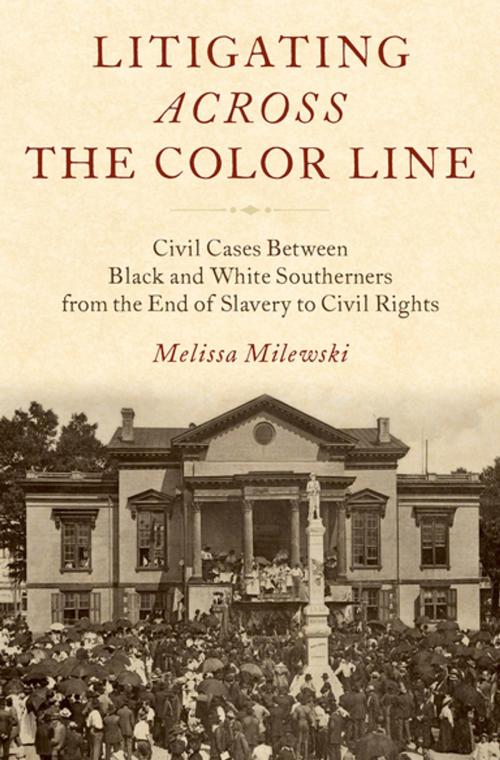Litigating Across the Color Line
Civil Cases Between Black and White Southerners from the End of Slavery to Civil Rights
Nonfiction, Reference & Language, Law, Legal History, History, Military, Americas, United States| Author: | Melissa Milewski | ISBN: | 9780190249205 |
| Publisher: | Oxford University Press | Publication: | November 1, 2017 |
| Imprint: | Oxford University Press | Language: | English |
| Author: | Melissa Milewski |
| ISBN: | 9780190249205 |
| Publisher: | Oxford University Press |
| Publication: | November 1, 2017 |
| Imprint: | Oxford University Press |
| Language: | English |
As a result of the violence, segregation, and disfranchisement that occurred throughout the South in the decades after Reconstruction, it has generally been assumed that African Americans in the post-Reconstruction South litigated few civil cases and faced widespread inequality in the suits they did pursue. In this groundbreaking work, Melissa Milewski shows that black men and women were far more able to negotiate the southern legal system during the era of Jim Crow than previously realized. She explores how, when the financial futures of their families were on the line, black litigants throughout the South took on white southerners in civil suits and, at times, succeeded in finding justice in the Southern courts. Between 1865 and 1950, in almost a thousand civil cases across eight southern states, former slaves took their former masters to court, black sharecroppers litigated disputes against white landowners, and African Americans with little formal education brought disputes against wealthy white members of their communities. As black southerners negotiated a legal system with almost all white gate-keepers, they found that certain kinds of cases were much easier to gain whites' support for than others. But in the suits they were able to litigate, they displayed pragmatism and a savvy understanding of how to get whites on their side. Their negotiation of this system proved surprisingly successful: in the civil cases African Americans litigated in the highest courts of eight states, they won more than half of their suits against whites throughout this period. Litigating Across the Color Line shows that in a tremendously constrained environment where they were often shut out of other government institutions, seen as racially inferior, and often segregated, African Americans found a way to fight for their rights in one of the only ways they could. Through these suits, they adapted and at times made a biased system work for them under enormous constraints. At the same time, Milewski considers the limitations of working within a white-dominated system at a time of great racial discrimination--and the choices black litigants had to make to get their cases heard.
As a result of the violence, segregation, and disfranchisement that occurred throughout the South in the decades after Reconstruction, it has generally been assumed that African Americans in the post-Reconstruction South litigated few civil cases and faced widespread inequality in the suits they did pursue. In this groundbreaking work, Melissa Milewski shows that black men and women were far more able to negotiate the southern legal system during the era of Jim Crow than previously realized. She explores how, when the financial futures of their families were on the line, black litigants throughout the South took on white southerners in civil suits and, at times, succeeded in finding justice in the Southern courts. Between 1865 and 1950, in almost a thousand civil cases across eight southern states, former slaves took their former masters to court, black sharecroppers litigated disputes against white landowners, and African Americans with little formal education brought disputes against wealthy white members of their communities. As black southerners negotiated a legal system with almost all white gate-keepers, they found that certain kinds of cases were much easier to gain whites' support for than others. But in the suits they were able to litigate, they displayed pragmatism and a savvy understanding of how to get whites on their side. Their negotiation of this system proved surprisingly successful: in the civil cases African Americans litigated in the highest courts of eight states, they won more than half of their suits against whites throughout this period. Litigating Across the Color Line shows that in a tremendously constrained environment where they were often shut out of other government institutions, seen as racially inferior, and often segregated, African Americans found a way to fight for their rights in one of the only ways they could. Through these suits, they adapted and at times made a biased system work for them under enormous constraints. At the same time, Milewski considers the limitations of working within a white-dominated system at a time of great racial discrimination--and the choices black litigants had to make to get their cases heard.















